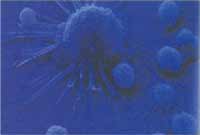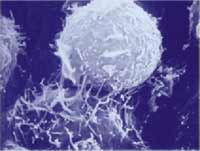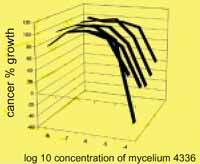At Master Hong Research & Development we are committed to
bringing our customers revolutionary new products based on the innovative
combination of ancient knowledge and cutting-edge biotechnological research.
We believe our patented Mycelium 4336 will revolutionize the biotechnology
industry and change the way everyday people think about disease prevention
and treatment. We present this information document as an inside look into
our phenomenal company and its remarkable new products.

Dr. Alan Rabson [2nd from left], Deputy Director of National Cancer Institute.
Master Hong Research & Development is a biotechnological company which, in
collaboration with the prestigious U.S. National Institutes of Health and National
Cancer Institute, has researched the genetics and pharmacokinetics of Mycelium
4336. This break-through research has led to revolutionary new products in
the arena of personal health. The National Institutes of Health, one of the
most prestigious scientific organizations in the world, was astounded to find
that our patented product actually inhibited and killed in vitro cancer cells!

Dr. Jeffrey White [2nd from left], Director of the National Cancer Institute
Office of Complementary and Alternative medicine.
Our company's aim is to incorporate this remarkable non-toxic substance into a series of nutraceutical products designed to enhance overall well being. In addition to Mycelium 4336's anti-cancer effects, its components include necessary proportions of the amino acids, vitamins, minerals and trace elements which are beneficial to the circulatory, immune, respiratory, digestive, urinary, reproductive and nervous systems. Thus, it has the potential to be a holistic drug/supplement. Mycelium 4336 can be used in combination with other recognized natural supplements to create an endless number of natural formulas suitable for use with a multitude of ailments. Specifically, these formulations can be designed for use as supplements for rejuvenation, weight loss, insomnia, detoxification, stress, fatigue, immune system regulation, memory enhancement, sexual energy enhancement, etc. All products will be made in accordance with U.S. Food and Drug Administration (FDA) guidelines. MASTER HONG Research & Development intends to remain in the forefront of biotechnology, exploring the numerous benefits of Mycelium 4336, and fully integrating it into the healthy lifestyle of the new millennium.
The National Institutes of Health operate under the auspices of the United States Department of Health and Human Services. The NIH performs hundreds of research projects annually to help better our understanding of illnesses. For the last three years they have collaborated with MASTER HONG Research & Development to develop mycelium 4336 and its possible uses in cancer therapeutics. To investigate mycelium 4336 as an anti- cancer agent, the National Cancer Institute (NCI), a subsidiary of the NIH, used one of the most advanced cancer screening procedures available, its "60 cell line screen". The design of the screen permits agents like mycelium 4336 to be evaluated using three particular "checkpoints": 1) the concentration of a substance that causes 50% of the cancer cells to cease growing; 2) the concentration that causes 100% of the cancer cells to cease growing; and 3) the concentration that causes 50% of the cancer cells to break open or lyse. For each of the three levels the mean value across all of the 60 cell lines is calculated and expressed as the Log10 value. Each individual cell line is then plotted as the difference from the mean value (in log terms). Using this advanced screening process, MASTER HONG Research & Development's patented Mycelium 4336 showed significant anti-tumor effects across a number of cancer types. The results of the study proved very interesting to other globally renowned biotech-nologists and many of them have agreed to perform further research on our product. Already, several research projects have been developed including collaboration with the NCI's Cancer Center at the University of Colorado. We estimate that when funding is secured, additional NCI Cancer Centers will be partnering with MASTER HONG Research & Development to take part in this remarkable research.
Mycelium 4336 is derived from a natural substance with a history of use dating back three thousand years. Today, MASTER HONG Research & Development uses the most advanced techniques of biotechnology to research and develop this natural substance's modern descendant, Mycelium 4336. The benefit of today's advanced technology allows for not only a radical increase in its health promoting components, it also greatly lowers the cost of production, making Mycelium 4336 accessible to a wider population. With low production costs and versatile applications, Mycelium 4336 is highly marketable, particularly in the fast growing "nutraceutical" market.
The use of DNA technology has brought about significant advances in experimental genetics, gene mapping, and the diagnosis and treatment of disease. These techniques have also formed the basis for the biotechnology industry and the commercial production of human gene products for therapeutic uses, and the transfer of genes across species in agricultural plants and animals. While Mycelium 4336's origin is in traditional Eastern medicine, the chemistry behind its astonishing attributes are based purely in modern science. Modern techniques of molecular analysis applied to these ancient formulations reveal interactive mechanisms of action that further support human observations of the past several thousand years.
For example, animal studies have demonstrated that extracts of nonchemically engineered mycelium has raised the phagocytic index of microphage and stimulated the secretion of interleukin1, while inducing the proliferation of splenic Thy-1 cells and stimulating synthesis and secretion of IgM. Fractions of mycelium have been found in animals to stimulate the replication of T lymphocytes and increase the number of interleukin-2 receptors that are expressed on B lymphocytes. In humans, aqueous extracts increase the activity of natural killer cells in both normal subjects and leukemia patients. Scientists have proven that components of mycelium are substantially more cytotoxic to terminal deoxynuleotidyl transferase positive (TdT+) leukemic cells in vitro in the presence of an adenosine deaminase inhibitor. Recent research has further proven that strains of the mycelium reduce damage to renal tubules and protect the Na+ and K+-ATPase on cellular membranes, which is associated with a reduction in cellular lipid peroxidation. In rats, fractions have alleviated hematuria and reduced the elevation of serum creatinine. Other effects upon smooth muscle tissue have been observed, whereby fractions of mycelia have reduced resistance and pressure in arteries, brain, and peripheral vascular systems. Such effects may be attributable to adenosine, the main water-soluble constituent, which acts to relax vascular smooth muscle and causes vasodilation. The mycelium also promotes platelet formation, helps prevent hypoxia, and acts as a monoamine oxidase inhibitor.

Antitumor effects have been observed using compositions of the mycelium. Warm water extracts prepared from dried mycelium inhibited Ehrlich ascites carcinoma cells, allogeneic to ICR mice, and Meth A fibrosarcoma, syngeneic to BALB/c mice, in vivo following tumor implantation and resulted in a statistically increased rate of survival of mice treated with extracts compared to controls. These studies show that a strain similar yet inferior to one produced by MASTER HONG Research & Development produces significant antitumor activity.
The immunomodulatory activity of compositions of the mycelium observed in vivo may be attributable to the elevated levels of cytokines, particularly the synergistic action of interlukin-gamma and tumor necrosis factor-alpha. For example, water extracts of the mycelium inhibited spontaneous liver metastases of Lewis lung carcinoma and B16 melanoma cells in syngenetic mice in vivo. While the value of mycelium is traditionally known, the strains valued for their antitumor attributes are rare and difficult to produce. MASTER HONG Research & Development has undertaken years of research and painstaking hands-on genetic engineering to produce in a lab setting a mycelium that is an immunoregulator. MASTER HONG Research & Development has also patented the mycelium, thus ensuring a definite market privilege to sell the mycelium. The MASTER HONG Research & Development team feels once the public has been informed of the potential of our bio-engineered product (through our national advertising campaign), the possibilities for growth are truly limitless.
The immune system is a network of millions of cells which offer a web of protection from infection and disease. When the immune system is compromised, some of the most devastating diseases such as AIDS or cancer may result.
Often, people associate immune system problems with an immunodeficiency, but an overactive or inappropriate immune response can be equally if not more problematic. MASTER HONG Research & Development's patented mycelium 4336 has been shown in research to address both of these problems and is often referred to as an immunoregulator. Our product not only supplements the under-performing immune system, but also regulates an over- or mal-performing system.

A large cancer cell with cellular processes, has been detected and surrounded by an array of killer cells.

Scanning electron micrograph of a normal T lymphocyte. T lymphocytes are specialized white blood cells that identify and destroy invading organisms such as bacteria and viruses. Some T lymphocytes directly destroy invading organisms, whereas other T lymphocytes regulate the immune system by directing immune responses
Cancer is a complex immune-associated disease that can affect any organ or system in the human body. It is a malignant, invasive cellular neoplasm that has the capability to spread throughout the body and body parts. The disease is one of the leading causes of death throughout the world populace. Cancer is uncontrolled cell growth, due to either genetic defect or toxins in one's environment. Treatments, such as radiation therapy or chemotherapy, are effective in some cases, but they can prove to be painful and/or debilitative.
Extensive research has shown that products related to MASTER HONG Research & Development's mycelium 4336, have been effective in treating various diseases, including cancer, for hundreds of years. Mycelium 4336 however, is the first strain actually proven by an NIH study to inhibit and destroy in vitro cancer cells. Recent policies of the U.S. government and the World Health Organization (WHO) urge increasing attention and funding to research advances in the particular areas of breast, prostate, and colon cancers.
Therapeutics for these three cancers are now gaining expedited approval by the FDA in light of growing mortality rates. The genetically advanced mycelium 4336 proved especially effective against these three cancers, as well as the leading cause of all cancer death, lung cancer.
Breast cancer is the second most commonly occurring cancer in women. It is also the second leading cause of cancer deaths overall. In the year 2000, 182,800 women will contract breast cancer in the United States, and 40,800 women will die from the disease. The five-year survival rate for breast cancer diagnosed in stage one (minimal metastasis) is a promising 98%. However, the rate drops to a dismal 16% five-year survival rate in a stage four case (maximal metastasis).
Breast cancer can be a difficult disease on social levels as well. Women who have breast cancer often endure surgical intervention which may range from the relatively moderate lumpectomy to the more severe radical mastectomy. Degree of metastasis again plays an important role in the survival rate. Graph 1 of the NCI research data shows that mycelium 4336 inhibited in vitro breast cancer cells, which suggests its potential in combatting breast cancer metastasis.


Prostate cancer is the second most common form of cancer, accounting for 11% of all male cancer deaths in the U.S. In the year 2000, 180,900 men in the United States will be diagnosed with prostate cancer and 31,900 men will die of it. Avoidance of mortality due to prostate cancer is directly linked to the localization of the tumor. Eighty-nine percent of men who are diagnosed with localized prostate cancer live at least five years. However, if the cancer is not localized (confined to the prostate), the rate of survival for 5-years is a disappointing 31%.
In an NIH study, MASTER HONG Research & Development's mycelium 4336 was shown to have significant anti-tumor effects on in vitro prostate cancer cells. This research opens the possibility that mycelium 4336 may somehow assist in the localization or shrinking of the cancer concentration, thus increasing survival rate. Graph 2 shows the NCI's data demonstrating the decrease in different prostate cancer cell lines' growth at different concentrations of mycelium 4336.

Lung cancer is the leading cause of cancer death in the U.S. for both men and women. According to the American Cancer Society, in the year 2000 there will be approximately 164,100 new cases of lung cancer in the United States. 89,300 men will die of lung cancer. 67,600 women will die of it as well, meaning more women will die of lung cancer than of breast cancer. If lung cancer is found and treated before spreading to lymph nodes, the five-year survival rate is approximately 49%. However, if the cancer is not confined, the survival rate falls to 14%.
In an NIH research study of MASTER HONG Research & Development's mycelium 4336, our product displayed significant anti-tumor activity in in vitro lung cancer cell lines. The significance of this research lies in our potential ability to assist in the decrease or halting of lung cancer metastasis, thereby improving the survival rate of lung cancer patients. Graph 3 outlines mycelium 4336's effectiveness in reducing the growth percentage of various in vitro lung cancer cell lines/according to NCI research


Colon and rectal cancers develop slowly in the gastrointestinal tract, often over a period of years. These cancers generally begin with precancerous changes (dysplasia or adenomatous polyps) in the inner lining of the colon or rectum. The cancer later spreads beyond the outer lining. Colorectal cancer is the third most common cancer diagnosis. In the U.S., 93,800 new cases of colon cancer and 36,400 cases of rectal cancer will be diagnosed in the year 2000, with colon cancer accounting for 47,700 deaths and rectal cancer claiming 8,600 victims. The five year survival rate for colorectal cancer is 90% if detected early, 8% if the cancer has metastasized. Once again, the key to survival is early detection and the inhibition of metastasis. Mycelium 4336 was effective in inhibiting the growth of in vitro colorectal cancer cell lines when tested by the National Institutes of Health. This data has potential importance with regard to discovering ways to decrease metastasis of colorectal cancers, thereby saving lives. Graph 4 illustrates the NCI data showing the decrease in cell growth of Colorectal Cancer cells when introduced to Mycellium 4336.